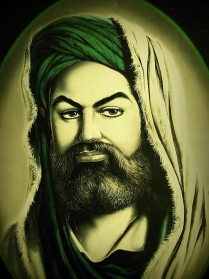Various Sayings by Imam Ali
An Extract of Du’a Kumayl
The following sayings of Imam ‘Ali (as) are taken from Dua Kumail,
trans. N. Husayn Mardi, Chehel Sotoon Theological School: Iran, 1989.
The most complete gift of God is a life based on knowledge.
The innumerable fools have made the learned very scarce.
The learned man understands the ignorant for he was once ignorant for he was once ignorant himself.
The ignorant man does not understand the learned for he has never been learned himself.
Knowledge gives life to the soul.
To respect the learned is to respect God.
Knowledge creates fear of God.
Practice makes knowledge perfect.
To teach is to learn.
Honesty is Divine language.
To fulfill promises is the highest form of integrity.
Truth means conformity of speech with the Divine mode of working.
Friendship is impossible with a liar.
Misrepresentation spoils narration.
Lying spoils news.
Enemity is the occupation of fools.
Ones obedience to God is proportionate to ones wisdom.
To fight against ones own desires is highest wisdom.
The wise aim at perfection.
The foolish aim at wealth.
To separate oneself from things of time and to connect oneself with things of eternity is highest wisdom.
He is really wise whose actions reflect his words.
Humility is the product of knowledge.
Self-conceit poisons the mind.
Self-conceit impedes progress.
Pride mars greatness.
Humility is one of the nets spread by real greatness.
Boasting issues from small minds.
Education and Conduct
Do not share the knowledge with which you have been blessed with everyone in general, as you do with some people in particular; and know that there are some men in whom Allah, may He he glorified, has placed hidden secrets, which they are forbidden to reveal. Remember the reply of the righteous slave to Moses when he said to him: May I follow you so that you can teach me what you know about what is right? He replied: Surely you will not be able to be patient with me. How can you be patient about something which you do not understand?.
Ref :
The Sayings and Wisdom of Imam ‘Ali (as)
The Muhammadi Trust, ISBN 0-946079-91-9
Contributed by Br. ‘Ali Abbas
abbas@seas.gwu.edu
Faith in Religion
When Imam ‘Ali was asked about Faith in Religion, he replied that the structure of faith is supported by four pillars endurance, conviction, justice and jihad.
Endurance is composed of four attributes: eagerness, fear, piety and anticipation (of death). So whoever is eager for Paradise will ignore temptations; whoever fears the fire of Hell will abstain from sins; whoever practises piety will easily bear the difficulties of life and whoever anticipates death will hasten towards good deeds.
Conviction has also four aspects to guard oneself against infatuations of sin; to search for explanation of truth through knowledge; to gain lessons from instructive things and to follow the precedent of the past people, Because whoever wants to guard himself against vices and sins will have to search for the true causes of infatuation and the true ways of combating them out and to find those true ways one has to search them with the help of knowledge, whoever gets fully acquainted with various branches of knowledge will take lessons from life and whoever tries to take lessons from life is actually engaged in the study of the causes of rise and fall of previous civilizations.
Justice also has four aspects depth of understanding, profoundeness of knowledge, fairness of judgement and dearness of mind; because whoever tries his best to under- stand a problem will have to study it, whoever has the practice of studying the subject he is to deal with, will develop a clear mind and will always come to correct decisions, whoever tries to achieve all this will have to develop ample patience and forbearance and whoever has done this has done justice to the cause of religion and has led a life of good repute and fame.
Jihad is divided into four branches: to persuade people to be obedient to Allah; to prohibit them from sin and vice; to struggle (in the cause of Allah) sincerely and firmly on all occasions and to detest the vicious. Whoever persuades people to obey the orders of Allah provides strength to the believers; whoever dissuades them from vices and sins humiliates the unbelievers; whoever struggles on all occasions discharges all his obligations and whoever detests the vicious only for the sake of Allah, then Allah will take revenge on his enemies and will be pleased with Him on the Day of Judgement.
Contributed by Br. ‘Ali Abbas
abbas@seas.gwu.edu
Imam ‘Ali on Knowledge
Knowledge and Acting on it
O you who carry knowledge around with you; are you only carrying it around with you ? For surely knowledge belongs to who ever knows and then acts accordingly, so that his action corresponds to his knowledge. There will be a people who will carry knowledge around with them, but it will not pass beyond their shoulders. Their inner most thoughts will contradict what they display in public, and their actions will contradict what they know.
The purity and nobility of knowledge
When a dead person is placed in his grave, four kinds of fire will cover him, but then the prayer will come and put one of them out, and the fast will come and put another one of them out, and then charity will come and put another one out, and knowledge will come and put the forth one out, and it will say : If I had come sooner, I would a have put all of them out, and given you delight for I am with you now, and youll not see anything else distressing.
Taken from:
The Sayings and Wisdom of Imam ‘Ali (as)
The Muhammadi Trust, ISBN 0-946079-91-9
Contributed by Br. ‘Ali Abbas
abbas@seas.gwu.edu
Imam ‘Ali on Intellect
A persons intellect becomes apparent through his dealings, and a mans character is known by the way he exercises authority.
The intellect is a king and characteristics are its subjects, so if it is weak in governing them, disorder takes place.
The intellect is better than desire, for the intellect makes you a king over your destiny, and desire makes you a slave of your destiny.
The intellect is a natural disposition which learns from experience.
The intellect is what arrives at what is correct through reasoning, and recognizes what has not yet happened through what has already taken place.
Use your intellect to understand something when you hear about it-the intellect that examines, that is, and not just the intellect that repeats what it hears, for surely there are many who repeat the knowledge that they hear, and there are few who examine it.
The one who has an intellect longs to be like the righteous people so that he can be of one of them, and he loves them so that he can be united with them in his love, even if he falls short in emulating their actions.
The one who has an intellect does not openly display it except in one of two situations: when he is furthest away from seeking something in the world, and when he is furthest away from abandoning it.
Surely hated adversity has final objectives in which it will inevitably end, so the one who has an intellect should try to sleep over it until this happens, for surely any attempt to stop it before it has come to an end will only intensify that hated diversity even more.
The first opinion of the person of intellect is the last opinion of an ignorant person.
The one who has an intellect finds harshness of life amongst persons of intellect more agreeable than a life of ease amongst the foolish.
Contributed by Br. ‘Ali Abbas, abbas@seas.gwu.edu
The Sayings & Wisdom of Imam ‘Ali (as)
The Muhammadi Trust
Zahra Publications
ISBN 0-946079-91-9
The Illusion of this World
Remember that this world which you covet so ardently and attempt to acquire so earnestly, and which sometimes annoys you and sometimes pleases you so much, is neither your home nor a permanent destination. You have not been created for it, nor invited to it as your resting-place. It shall neither remain with you for ever, nor will you remain in it eternally. If it has enticed you away with its charrns, it has also warned and cautioned you of real dangers lurking in its folds. Take account of the warnings it has given you and do not be seduced or deceived by its allurements. Let these warnings frighten you from being too greedy to possess it. Try to advance towards the place where you are invited for eternal bliss and turn your face away from the vicious world.
Imam ‘Ali ibn Abi Talib (as), from Nahjul Balagha, the Peak of Eloquence.
The Sayings of Imam ‘Ali regarding the heart
I am amazed at the heart of man: It possesses the substance of wisdom as well as the opposites contrary to it ... for if hope arises in it, it is brought low by covetousness: and if covetousness is aroused in it, greed destroys it.
If despair possesses it, self piety kills it: and if it is seized by anger, this is intensified by rage. If it is blessed with contentment, then it forgets to be careful; and if it is filled with fear, then it becomes pre-occupied with being cautious. If it feels secure , then it is overcome by vain hopes; and if it is given wealth, then its independence makes it extravagant.
If want strikes it, then it is smitten by anxiety. If it is weakened by hunger, then it gives way to exhaustion; and if it goes to far in satisfying its appetites, then its inner becomes clogged up. So all its shortcomings are harmful to it, and all its excesses corrupt it.
There are four things that make the heart die: wrong action followed by wrong action, playing around with foolish people, spending a lot of time with women, and sitting with the dead. Then they asked Imam ‘Ali: And who are the dead, O Commander of the believers? He replied: Every slave who follows his desires.
Surely want is a trial, and having sickness of the body is more difficult to bear than indigence, and having a sickness of the heart is more difficult to bear than having a sickness of the body. Surely being very wealthy is a blessing, and having a healthy body is better than being very wealthy, and having awe of Allah in your heart is better than having a healthy body.
Surely hearts have desires, and they turn towards, and they turn away ... so approach them by means of what they desire and what they turn towards, for surely if the heart is forced to do some thing against its will, it goes blind.





